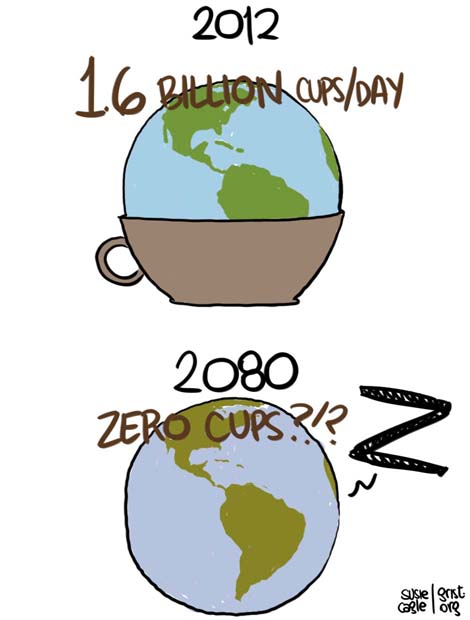Is Arabica nearly eradica? Arabica coffee beans could be extinct in the wild by 2080 because of climate change, according to a new study by researchers at London’s Royal Botanic Gardens, Kew. All weekend the internet freaked out about the looming coffee apocalypse. It was kind of like this.

Arabica is the backbone of the coffee industry, accounting for 70 percent of global production, according to the International Coffee Organization. But most of it can be traced back to a handful of plants taken from Ethiopia in the 17th and 18th centuries, [said Aaron Davis, head of Kew’s coffee research program], and its narrow gene pool makes it “very susceptible” …
The prospects are “profoundly negative,” the study concluded. Even in a best-case scenario, two-thirds of the suitable growing locations would disappear by 2080 — and at worst, nearly 100 percent. And that’s factoring in only climate change, not deforestation.
One takeaway from this: If things get really bad, we can always switch to Robusta, which stands to survive better as it can grow at lower altitudes and higher temps. Another takeaway: Oh god this is really bad.
Previous studies have established that both wild and cultivated Arabica are very climate sensitive, thriving only within a very narrow range of temperatures, Davis noted.
“So even if you do some very simple sums, it doesn’t take much to realize that there’s an intrinsic threat to these species from accelerated climate change,” he said. “The logical conclusion is that coffee production will be negatively impacted as well.”
The purpose of the study isn’t to scare people, Davis said, but rather to inspire action.
“We’re trying to understand: What if we don’t do anything—what will happen? And what can we do about it now?” Davis said. “If we’re proactive, we can avoid a dire situation.”
If Davis seeks to inspire people to act, I think a little fear wouldn’t hurt. But by 2080 we’ll probably have so many other climate-change stresses that a switch to herbal tea might be best anyway.



